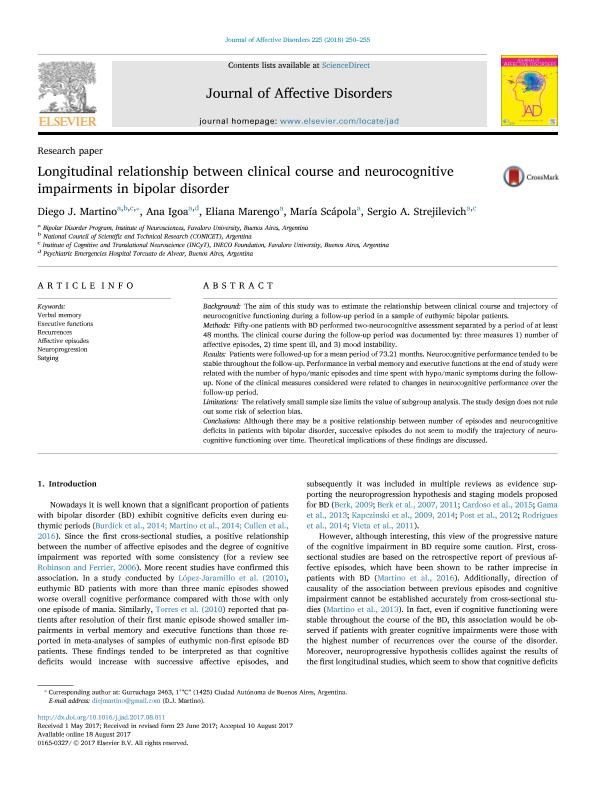Mostrar el registro sencillo del ítem
dc.contributor.author
Martino, Diego Javier

dc.contributor.author
Igoa, Ana

dc.contributor.author
Marengo, Eliana

dc.contributor.author
Scápola, María
dc.contributor.author
Strejilevich, Sergio

dc.date.available
2020-03-05T20:32:22Z
dc.date.issued
2018-01
dc.identifier.citation
Martino, Diego Javier; Igoa, Ana; Marengo, Eliana; Scápola, María; Strejilevich, Sergio; Longitudinal relationship between clinical course and neurocognitive impairments in bipolar disorder; Elsevier Science; Journal of Affective Disorders; 225; 1-2018; 250-255
dc.identifier.issn
0165-0327
dc.identifier.uri
http://hdl.handle.net/11336/98878
dc.description.abstract
Background The aim of this study was to estimate the relationship between clinical course and trajectory of neurocognitive functioning during a follow-up period in a sample of euthymic bipolar patients. Methods Fifty-one patients with BD performed two-neurocognitive assessment separated by a period of at least 48 months. The clinical course during the follow-up period was documented by: three measures 1) number of affective episodes, 2) time spent ill, and 3) mood instability. Results Patients were followed-up for a mean period of 73.21 months. Neurocognitive performance tended to be stable throughout the follow-up. Performance in verbal memory and executive functions at the end of study were related with the number of hypo/manic episodes and time spent with hypo/manic symptoms during the follow-up. None of the clinical measures considered were related to changes in neurocognitive performance over the follow-up period. Limitations The relatively small sample size limits the value of subgroup analysis. The study design does not rule out some risk of selection bias. Conclusions Although there may be a positive relationship between number of episodes and neurocognitive deficits in patients with bipolar disorder, successive episodes do not seem to modify the trajectory of neurocognitive functioning over time. Theoretical implications of these findings are discussed.
dc.format
application/pdf
dc.language.iso
eng
dc.publisher
Elsevier Science

dc.rights
info:eu-repo/semantics/openAccess
dc.rights.uri
https://creativecommons.org/licenses/by-nc-nd/2.5/ar/
dc.subject
AFFECTIVE EPISODES
dc.subject
EXECUTIVE FUNCTIONS
dc.subject
NEUROPROGRESSION
dc.subject
RECURRENCES
dc.subject
SATGING
dc.subject
VERBAL MEMORY
dc.subject.classification
Psiquiatría

dc.subject.classification
Medicina Clínica

dc.subject.classification
CIENCIAS MÉDICAS Y DE LA SALUD

dc.title
Longitudinal relationship between clinical course and neurocognitive impairments in bipolar disorder
dc.type
info:eu-repo/semantics/article
dc.type
info:ar-repo/semantics/artículo
dc.type
info:eu-repo/semantics/publishedVersion
dc.date.updated
2020-03-05T14:59:10Z
dc.journal.volume
225
dc.journal.pagination
250-255
dc.journal.pais
Países Bajos

dc.journal.ciudad
Amsterdam
dc.description.fil
Fil: Martino, Diego Javier. Consejo Nacional de Investigaciones Científicas y Técnicas; Argentina. Universidad Favaloro. Área de Investigación y Desarrollo; Argentina
dc.description.fil
Fil: Igoa, Ana. Universidad Favaloro. Área de Investigación y Desarrollo; Argentina. Gobierno de la Ciudad de Buenos Aires. Hospital de Emergencias Psiquiáicas "Torcuato de Alvear"; Argentina
dc.description.fil
Fil: Marengo, Eliana. Universidad Favaloro. Área de Investigación y Desarrollo; Argentina. Consejo Nacional de Investigaciones Científicas y Técnicas; Argentina
dc.description.fil
Fil: Scápola, María. Universidad Favaloro. Área de Investigación y Desarrollo; Argentina
dc.description.fil
Fil: Strejilevich, Sergio. Universidad Favaloro. Área de Investigación y Desarrollo; Argentina
dc.journal.title
Journal of Affective Disorders

dc.relation.alternativeid
info:eu-repo/semantics/altIdentifier/doi/http://dx.doi.org/10.1016/j.jad.2017.08.011
dc.relation.alternativeid
info:eu-repo/semantics/altIdentifier/url/https://www.sciencedirect.com/science/article/pii/S0165032717308704
Archivos asociados
